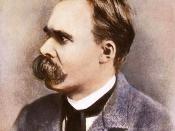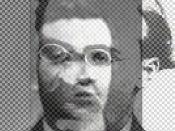The Existentialism in Nietzche and Camus A philosopher's profound insight may be determined and influenced by his adolescent years. Thus, his writings may reflect upon the good or bad experiences from his childhood and early age, therefore creating his philosophy. Pertaining to this case, Friedrich Nietzsche was born in Rocken, Prussia on October 15th, 1844. His obstacles and influences in life caused him to live the existentialist way. First, he lost his father, a Lutheran minister, in 1849, which caused him to spend his childhood surrounded by his mother, sister, grandmother, and two maiden aunts. This surrounding was dominated by women, godliness, and provincialism, three things he detests later in life (14.4). Next, Nietzsche's schoolmates called him "the little minister,"ÃÂ and described him as "a Jesus in the Temple."ÃÂ Thus, at age 18, Nietzsche lost his faith in the God his father believed in and spent the remainder of his life looking for a new deity (Durant 303).
Also, his father's ministry caused Nietzsche to attack Christianity later in life because there was so much of its moral spirit in him, therefore his philosophy was an attempt to balance and correct his life (Durant 302). Nietzsche spent most of his social life in solitude, because despite the great value he attacked to friendship, he was not able to retain many friends (14.9). Nietzche's lack of friends caused him a touch of madness that later was to overwhelm him and become noticeable in his behavior. In 1858 he began boarding Brown 2 school at the University of Bonn, despite of his poor health, and studied theology and classical philosophy. Later, Nietzsche returned to Leipzig where he became influenced by Kant, Schopenhauer, and the composer Richard Wagner. In 1869 he was appointed to the chair in philosophy at Basel, yet he resigned...


